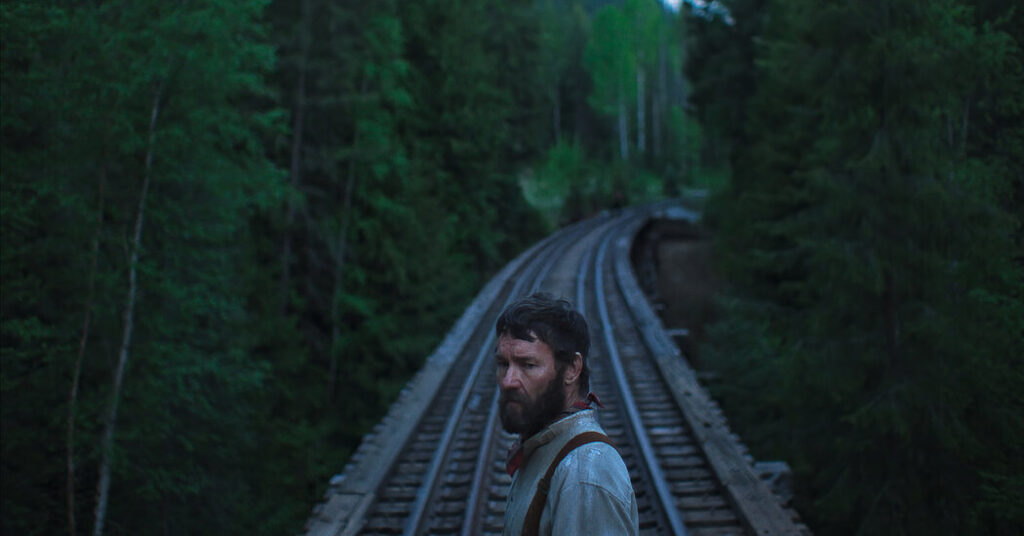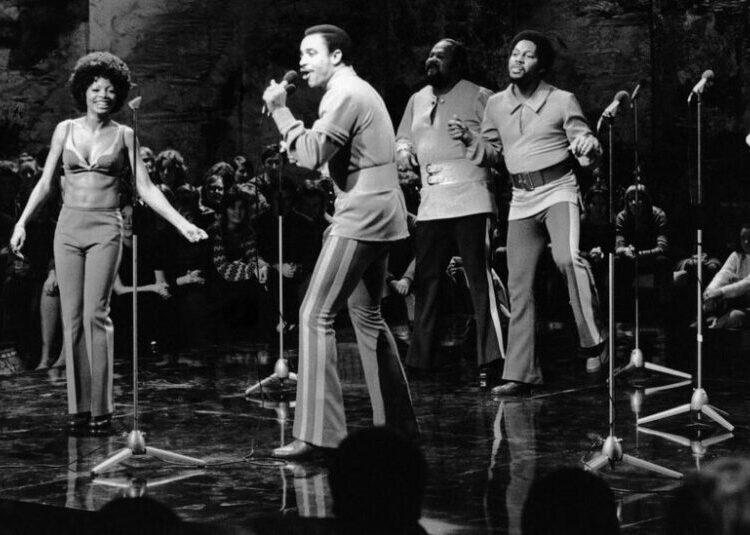When three laborers die suddenly a little ways into “Train Dreams,” victims of a freak accident out in the woods, the other men on their crew nail their boots to slender trees near the little heaps of dirt that serve as their graves. “Now they won’t just pass out of this world without nothin’ to show they was here,” one man remarks. Robert Grainier (Joel Edgerton), one of the laborers, gives the boots a long look before he and the others move on.
It is one among a host of quiet moments in “Train Dreams,” Clint Bentley’s modest, luminous adaptation of Denis Johnson’s 2011 novella, set in the early 20th century. (Bentley wrote the screenplay with Greg Kwedar, and the two last collaborated on the script for the remarkable film “Sing Sing,” which Kwedar directed.) This film changes some details from Johnson’s story, but the essence remains: Robert lives an unremarkable life — which is to say, the kind most people live, the kind that rarely merits a whole book. Yet in the brief space of conveying his small life, the book — and now the film — gives us the whole world.
Johnson’s novella can be read in roughly the amount of time it takes to watch this adaptation, so the film preserves the emotional pacing of its source material remarkably well. A narrator (Will Patton) tells us Robert’s life story, occasionally remarking that he will recall this detail in the future, or remember that moment as the happiest. As viewers, we have more of a God’s eye view of Robert’s life than he does, sliding back and forth along his timeline.
But in general we encounter him chronologically, as a character in a storybook. He didn’t remember his parents, but arrived in a small town in Idaho when he was “6, or possibly 7.” He never feels as if he fits in. We see encounters from his life as discrete memories that lodge in his mind for whatever reason, things that bother or stick with him. We watch him grow into manhood and become a train laborer, working with teams of men who clear land, building the railroads that will connect the country from coast to coast. In a formative moment, we observe him as he watches other white men throw a Chinese laborer off the bridge into the river, and he doesn’t manage to stop them. It is a moment that will haunt him.
It’s hard to imagine anyone but Edgerton in this role. Though he’s a prolific actor, he’s still underestimated; he’s at his most superb when his manner is gentle, and he’s capable of doing so much with so little. His performance in “Train Dreams” reminds me of his brilliant work in the 2016 film “Loving,” in which he barely says a word and yet communicates great depths of strength and emotion. Here he moves from passivity to passion to grief to wonder — it’s a beautiful role for him, and he broke my heart.
Everything snaps into focus when Robert meets Gladys (Felicity Jones). She awakens something in him — an attention to beauty, to the life he might live rather than just observe from the outside — and soon, they are married. With their baby daughter, they begin to build a life on a little plot of land, though he has to leave for months each year to join a crew and earn money for the family. Out in the forests, he meets eccentric figures — most notably Arn Peeples (William H. Macy), who knows everything about explosives, and who seems to have wisdom that Robert covets. It is wisdom that Robert holds tight when he returns home to find that his life has changed in ways he cannot fathom.
Robert’s story shifts then, but not in ways we expect. You could describe it as episodic, I suppose, but that doesn’t feel quite right: Life unfolds in episodes, but they’re not detached from one another. People move in and out of our lives; old memories resurface and new people paint them differently, and we learn to view them anew.
What this requires is careful seeing, and “Train Dreams” beckons us to see. Working with the cinematographer Adolpho Veloso, Bentley takes a literary tale and figures out how to translate it into cinema. This is an astonishingly beautiful film, shot mostly in Washington state and making full use of the Pacific Northwest: those mountains, the stark verticality of those trees, the sunsets almost too achingly stunning to be real. It’s hard to believe the aftermath of a forest fire could be so beautiful. Certainly a skilled writer can evoke all of this, but a filmmaker can show you.
And this is also a film about perspective. Several times, Robert — a man of the earth, the sort of guy who stays close to the ground — has occasion to be up high. Once it’s from a train window, looking at a bridge he worked on years earlier. Once it’s in an observation tower occupied by a surveyor (Kerry Condon) who’s looking at land once ravaged by a fire, and Robert can see new growth. Once it’s from an airplane, looking out at a landscape from a previously unimaginable height.
Each successive elevation gives him a new perspective on where his life has been, and where it’s taken him. The grand sweep of our lives, “Train Dreams” suggests, is the sort of thing we can only begin to understand when we’re reaching life’s end, and even then we may only grasp it dimly. Like the boots nailed to the tree, human life is fleeting in the face of the earth’s long life span, the forests that were there before we existed and will still be there long after we’re gone, if we don’t tear them apart first.
But, as the surveyor tells Robert, “the world needs a hermit in the woods as much as a preacher in the pulpit.” It’s all knit together. You just can’t see it unless you get up high enough to look.
Train Dreams Rated PG-13, mostly for tragedy and heartache. Running time: 1 hour 42 minutes. Watch on Netflix.
Alissa Wilkinson is a Times movie critic. She’s been writing about movies since 2005.
The post ‘Train Dreams’ Review: Life, Understood in Reverse appeared first on New York Times.




